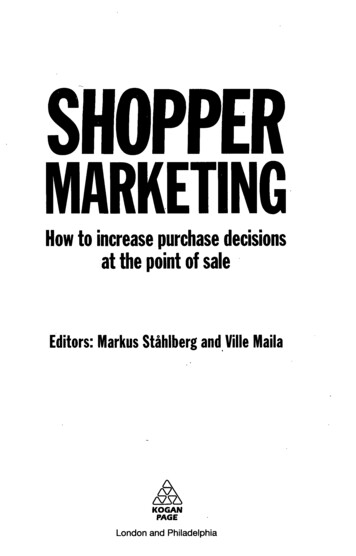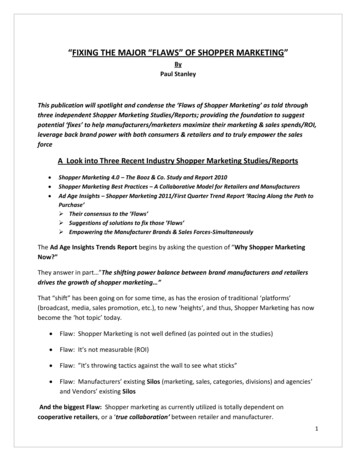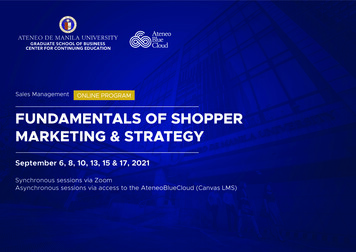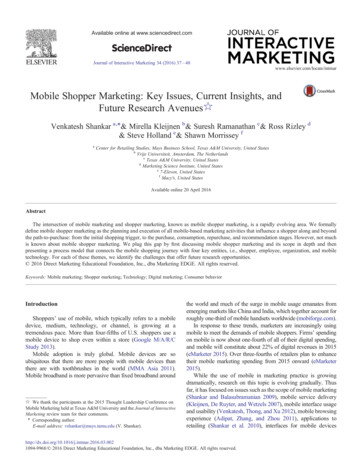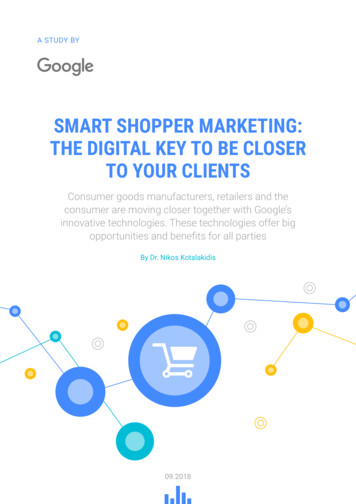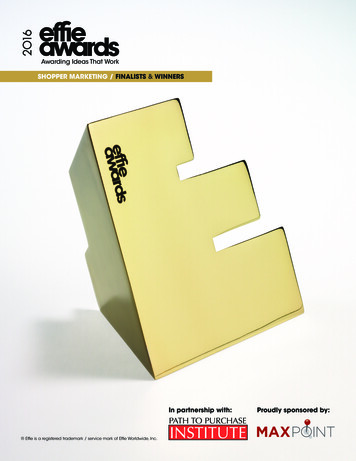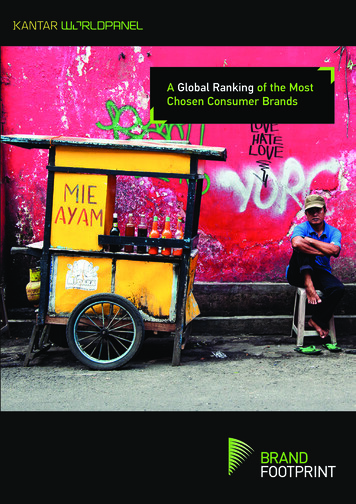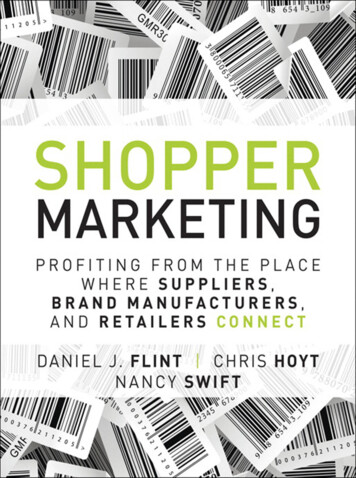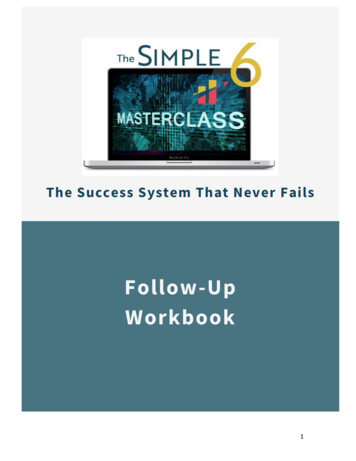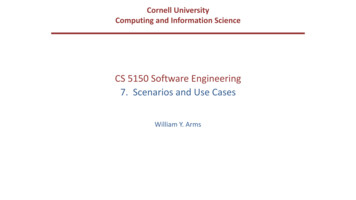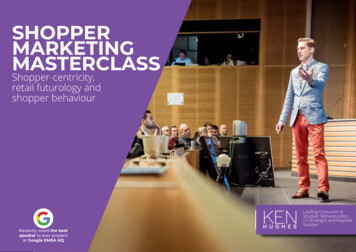
Transcription
il futurology andshopper behaviourRecently voted the bestspeaker to ever presentRecently voted the bestat Google EMEA HQspeaker to ever presentat Google EMEA HQLeading Consumer &Shopper Behaviouralist,CX Strategist and KeynoteSpeaker
The Case for EffectiveShopper MarketingThe Power of the ShopperToday there is no doubt that the shopper holds the power, not the brand or theretailer. Loyalty continues to dissolve for both brands and store banners. Forevery opportunity omnichannel presents, it also presents significant challengesfor retailers and manufacturers to hold on. The fate of your brand or your storenow lies in theshoppers hands, more than it has ever before.The Golden Moment of TruthThis is it. The moment the shopper either chooses to buy from your category or not.To buy your brand or not. To put another item in the basket or not. Everything thathas gone before has built up to this moment. All the research and innovation, theproduct development and packaging, the logistics and promotion, the marketingand strategy. In the split seconds that shoppers make decisions, you are eithergoing to succeed or fail – don’t you think we should do our utmost to CONTROLthis decision? ‘Last Metre Marketing’ has become centre stage for organisationseager to see strategy turn into sales and profits, be that in-store at the shelf, onlineor anywhere along the Path to Purchase.The Evolution of Shopper MarketingShopper Marketing is a behavioural science, one that borrows from consumerpsychology, behavioural economics, neuro-marketing as well as from social andcultural anthropology. It focuses on understanding shopping and consumptionbehaviours, leveraging insight to effect change and ultimately build brand equity
and profit. Previous retail management theories in consumer goods have hadlimited success for all parties. Trade Marketing remains a blunt negotiationinstrument relating to product feature in-store, having now become a revenuestream for the retailer and a ‘necessary evil’ for the brands hungry for promotionvolumes. Category Management promised a win-win but never fully .delivered,becoming for most an efficiency-led model delivering small single digit returnsonce initial inefficiencies were addressed.Shopper CentricityShopper Marketing aims to change shopper behaviours, is focused on triggeringincremental sales and does so to the benefit of both manufacturer and retailer.It is also a genuinely shopper centric model. For years organisations have beenclaiming to be shopper centric but the evidence shows otherwise. Stores that areoperationally led, manufacturers that are brand led.Shopper Marketing is now one of the biggest growth areas globally (alongsideDigital Marketing) as the focus shifts to the shopper. Organisations that fail toequip themselves for this change will find themselves quickly irrelevant in the newretail landscape.
Somequotesfrom thisMasterclass“Most retail and consumer goods companies are stuck in the1980’s or 1990’s when it comes to Shopper. Few have madethe change to true shopper centricity. Instead they remainstuck in an everlasting cycle of trading negotiations”“The over reliance on price promotion in the consumer goodsindustry is madness. Itdemonstrates a short sightedness and obsession about salesvolumes at all costs. The Marketing and Trading managersof today are steering the brand and store equity ship on tothe rocks”“Good Shopper Marketing initiatives build brand equity forthe manufacturer, drive sales and profit for the retailer andincrease shopper satisfaction and category involvement. Itis truly a win-win-win”
4Key learnings1Why Shopper Centricity is no longer a choice for either retailer or2How to deliver excellent shopper marketing strategies for yourmanufacturer, but an ethos for every organisation to embrace.brand or store by using creativity, innovation and availabletechnologies.3How to utilise non-traditional sales and marketing strategies to4How to prepare for the new challenges that Shopper Marketingcatalyse your sales growth.bring to the organization.
“Ken’s Shopper masterclass at Baltika Brewery (Russia)was both informative and entertaining, managing to holdpeople’s attention for all eight hours. Ken was very effectivein transforming theory into practice and answering thespecific business needs of our Retail & FMCG industry. Wegained significant insights and inspiration for our futurework and are now reviewing our approach to shopperinsight. I would strongly recommend this master class toany organization”KIRILL SHPARABALTIKA BREWERY“We brought Ken into our organization to energise ourthinking around Shopper Marketing. It was a roaringsuccess and definitely had the desired effect! It resultedin very ‘buzzed-up’ team members and some very healthyconversations in the weeks following around how we canimprove on Shopper Marketing, Shopper Insight andData Analysis, both within our organisation and with ouragencies”GILL IRVINEHEINEKEN“Ken Hughes led a Shopper Masterclass for 40 Unileverconsumer, customer & shopper marketing managers inEurope for me. The Masterclass was highly inspirationalbut at the same time practical enough for managers tobring back to their daily jobs. Feedback was very positiveand people spontaneously came to me to thank me forthe master class saying they had not experienced suchan inspirational and engaging workshop for a long time.If you want to have an inspiring and leading edge thinkeron shopper marketing, Ken Hughes is your man, but beprepared to leave his workshop thinking different aboutshopper marketing than ever before!”GUIDO HAGENAARSUNILEVER
theAgenda
1234The Evolutionof Retail ManagementInside the Mindof the ShopperEngagement: A ShopperFive Senses ApproachtThe New Shopper DNA:The Digital Native AdvanceObjetiveObjetiveObjetiveObjetiveTo ground the Shopper Marketing theoryTo explore the reality of shopperTo illustrate how we can engage shoppersTo open a discussion about the rolein the reality of retail and to ensurebehaviour within consumer goods andand trigger incremental sales behavioursthat digital plays in Shopper Marketingdelegates understand the evolution fromhow routine shopper behaviours deterby utilising a multi-sensory approachand to illustrate how consumer goodsprevious retail management theories.incremental sales growth (and howin-store and by applying innovative andcompanies need to be aware of thebetter engagement will open up impulsenew approaches (illustrated by globalkey shifts in expectations of the newsales).case studies).consumer. Trade marketing, category management The neuro-science behind routine The noise of what we see in-storeThe digital native v the digital immigrant:& now shopper marketingshopper behaviours Why observing shoppers is keya changing consumer Where category management failed and The unconscious mind and habitualin understanding how to change The step change of the new shopperwhy shopper marketing is differentpurchase behavioursbehaviours Hyper-connectivity and what it means The difference between shopper and The need for positive disruption What eye-tracking and other biometricfor the shopperconsumer (marketing) The emergence of experiential retailresearch tools show us The shift in trust: from us to them A changing and challenging path to Moving from a persuasion model to a How using breakthrough pos achieves(peer networks)purchaseseduction model (emotive triggering)cut through in-store Self-centricity, generation me and the A changing and challenging path to How scent marketing increasesneed for personalisationpurchaseconsideration & purchase The “I want it now” shopper. Instant How sound marketing influencesgratification & same day deliveryshopper decisions in-store The sharing economy and the Why taste and sampling are so criticalexperiential consumer How technology advances are helping The destruction of the value chain (andus better target samplingthe implications for shopper marketing) The daily reality of the retailer : supplierstruggle and the collaboration myth How NFC, RFID and augmented realitydeliver for shopper marketing
5678ShopperIrrationalityBig Data vBig InsightSell the Benefit not theFeaturesShopper MarketingPitfallsObjetiveObjetiveObjetiveTo outline how non-traditional approachesTo discuss the role of data and insight inToaTo outline the challenges organisationsto sales and marketing can increase salesShopper Marketing and to plot a course‘product’ focus to a ‘solution’ focus andface as Shopper Marketing beds downutilising behavioural economic theoryfor the future as data sources increase inhow Shopper Marketing aims to driveand how to avoid these pitfalls going(the psychology of decision making) andfrequency and complexity.Shopper Satisfaction by driving thisforward.how this can be integrated into ShopperMarketing strategy.understandObjetivethemovefromchange. Getting shopper marketingPredictive modelling Shoppers buy solutions not productscommunication right in-store (and How irrationality defines us as humans Using data along the path to purchase What are we really selling? Sell thebeyond)(and thus as shoppers) Data v insight : understanding thebenefits Why category management is not How the herding effect works (and howdifference Shopper marketing driving behaviouralenoughwe can harness it in-store) Data v resource: the imbalance inchange in consumption The need for innovation and creativity Why decisions are difficult for shoppersshopper marketing Proving shopper marketing roi(and how over-complicated product Where shopper marketing fits in anranges don’t help)organisation structure (and budgets) Nudging the shopper: nudge, push, Weaning activity from the promotionshove. Loading the decision dicedrug & moving to strategic use of How to use choice architecture to getpromotionsshoppers to buy what you want them to Better execution in-store Why loss aversion results in so manyfailed new products in consumer goods How priming works and how to utilise itin-store Why we need to arouse shoppers andbetter manage their expectations
Shopper Safari(Immersion)ObjetiveTo put delegates ‘directly’ in the shoes of the shopper and to bring to life thechallenges and opportunities that are presented in-store within Shopper Marketingstrategy.Here we expose management and strategy teams to the everyday real decisionsshoppers are making in store, relating to your SKUs, brands, categories, within thecontext of the whole store. Too often senior management are a great a distancefrom the shopper and a few store visits a year doesn’t bridge that gap. Nothing everbeats ‘walking a mile’ in the shopper’s shoes. Here delegates meet real shoppers,interview them and then shop for their families.The main ‘value’ from this exercise is the understanding of the REAL reasons finalSKU decisions are made. Sometimes low price isn’t the answer. Sometimes routineand habit blind a shopper to other better alternatives. Sometimes a shoppermakes decisions based on emotion and not along rational cost/benefit lines.The REALITY of the shop versus our pre-determined expectations of consumerand shopper behavior is key to the experience. Each project team discuss theirkey findings from the experience, what they have learned and more importantly,what their experience shopping in tandem for a ‘real live shopper’ has taught themregarding shopper decision making in-store.
Implication WorkshopsWhere working internally with one organisation or company, we can in-buildimplication workshops to the programme as we move through the varioussegments of the thought leadership and exercises.Usually done in teams, we apply the theory learned and any practical examples tothe business, using the session as a strategy setting catalyst.What does this mean for the organisation? How best to implement? What are thechallenges? How do we best move forward?This adds another dimension to the masterclass, moving from a training to a visionsession.Also many clients will use this opportunity to get delegates to work on a real businesscase, new product launch or pending campaign. This moves the conversation onthe day from the theory of the course to a practical implementation workshop andis highly effective in bringing the process and theory to life, taking the businessissues into account.
AboutKen HughesEvery year, Ken speaks to tens of thousands of participantsall over the world. He has performed in arenas and smallboutique events, led full-day sessions and 18-minute TEDtalks. Drawing on his experience as a global speaker,actor and strategist, this is one session that will deliver.Recently voted the bestspeaker to ever presentat Google EMEA HQKen has been a full-time motivational speaker for over 7years. Prior to that, he has spent his entire life performingto and training corporate audiences, as a consultant andCEO of a boutique insight agency. He also trained as anactor in his earlier life, later blending those skills into hiscorporate world.Ken advises some of the biggest brands in theworld on customer experience, omnichannelstrategy, shopper marketing, retail trends, themillennial and Gen Z shopper and the peerto- peer economy. As an accomplished author,TED speaker, university lecturer and actor, hisperformances are not only insightful and thoughtprovoking but are infamous for their sheer energy,entertainment and passion, not to mention hisgenerous Irish wit.Every year, Ken shares his thought-disrupting insightwith tens of thousands of delegates all over the worldas one of the most popular keynote speakers bookedon the international conference circuit. He is regularlyvoted best speaker at events to which he is invited tospeak and believes in engaging and delighting eventattendees at every opportunity.Embed showreel in this page World Renowned Consumer& Shopper Behavioralist Author of The Blue Dot Consumer Keynote Speaker & CX Strategist
BOOK THISWORKSHOPhello@kenhughes.info www.kenhughes.infoThis a great speech for an internal HR event, or an industryevent showcasing the challenges facing the HR industry asa whole. It can be tailored to a specific congress theme orpresented as broad commentary. Bespoke tailoring of aspeech to the needs of the event producer is standard in sie
The Evolution of Shopper Marketing. Shopper Marketing is a behavioural science, one that borrows from consumer . psychology, behavioural economics, neuro-marketing as well as from social and cultural anthropology. It focuses on understanding shopping and consumption behaviours, leveraging insight to effect change and ultimately build brand equity
